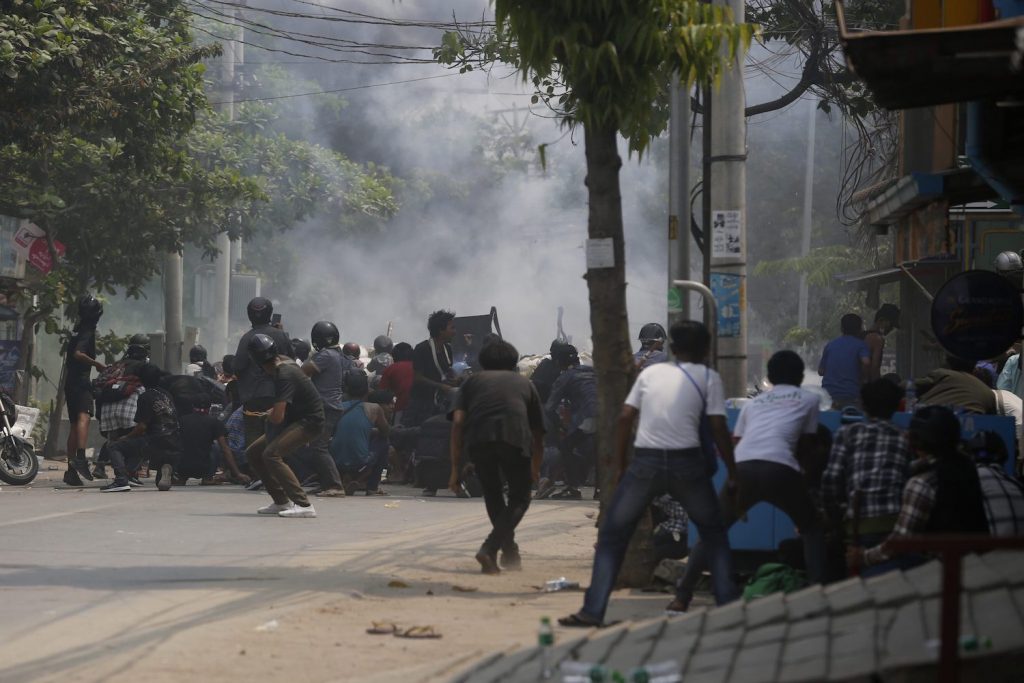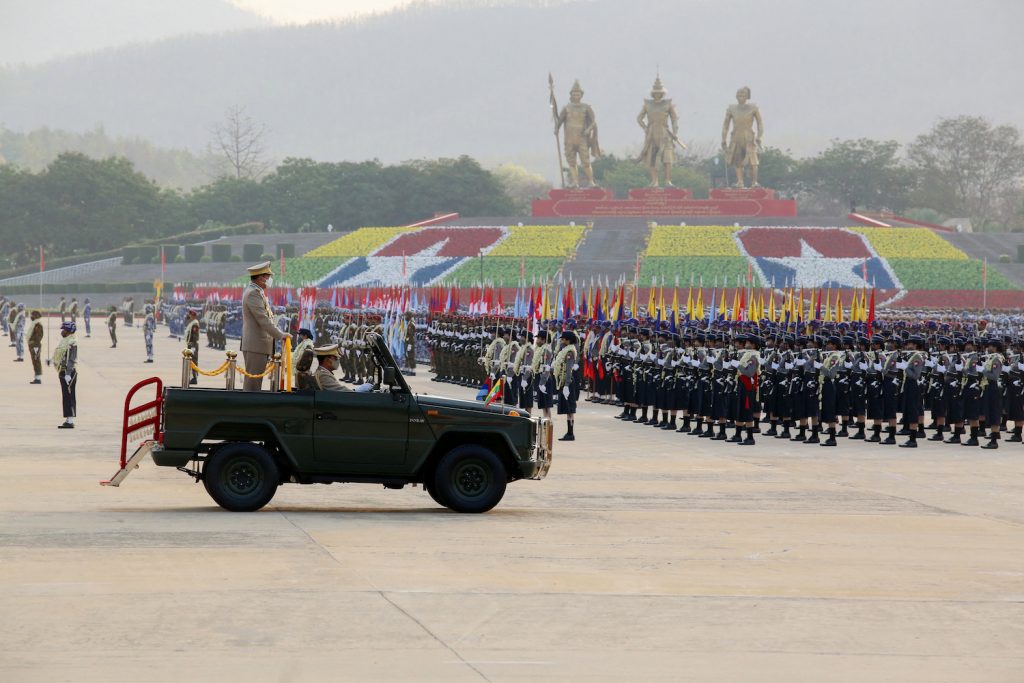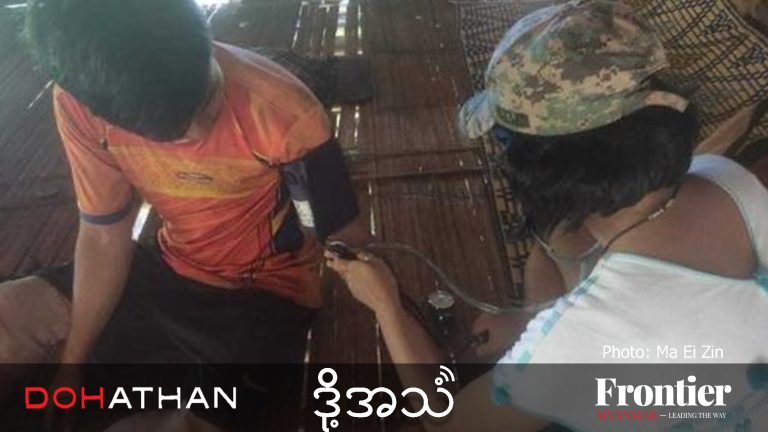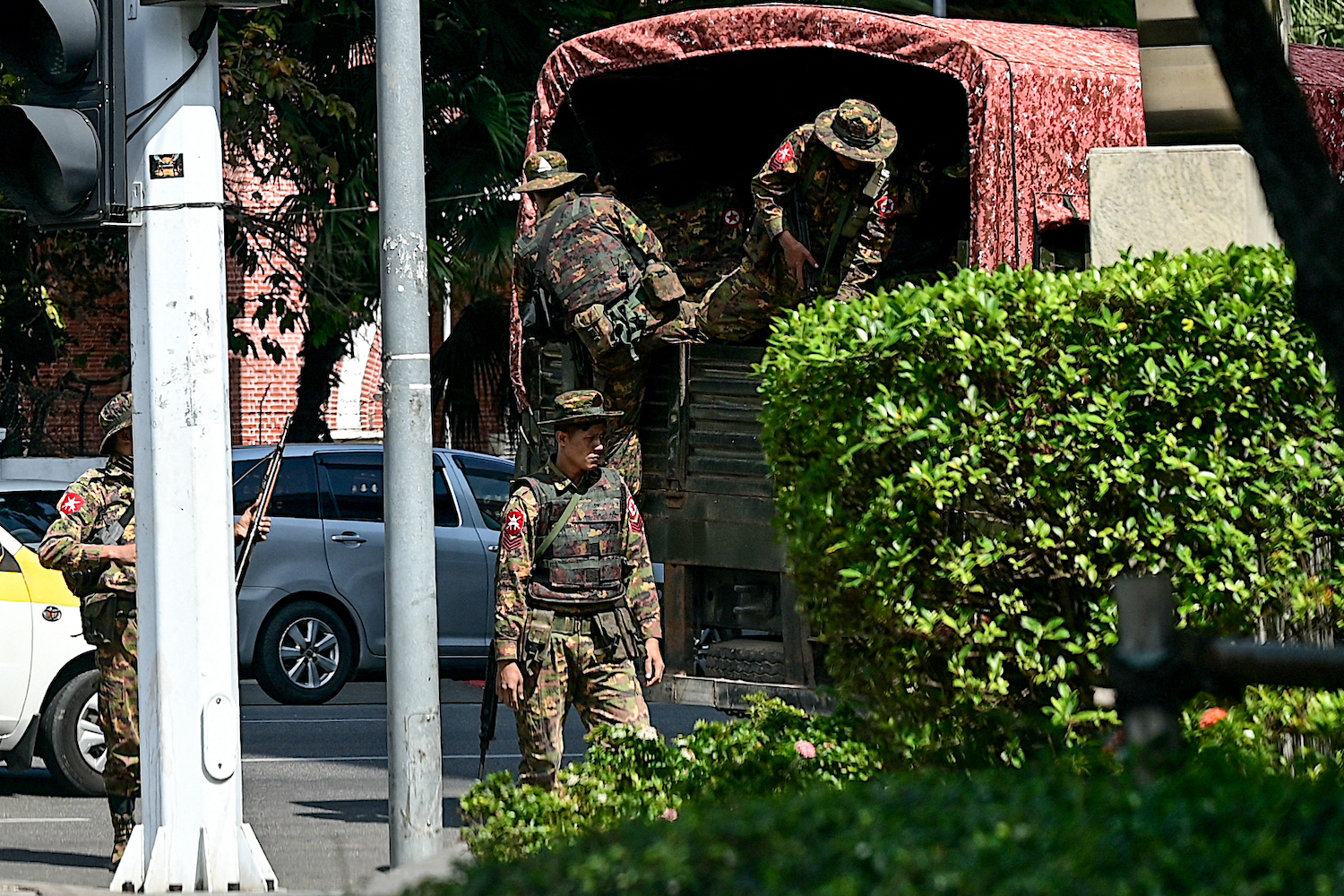Marking Armed Forces Day, also the anniversary of the military’s bloodiest protest crackdown, the junta pledges to annihilate resistance as Western countries unveil new sanctions.
By AFP
Myanmar’s junta will “annihilate” coup opponents, Senior General Min Aung Hlaing said March 27 as the military staged a show of force on the anniversary of its bloodiest crackdown so far on democracy protests.
The country has been in chaos since a putsch in February 2021, with more than 1,700 people killed in crackdowns on dissent, according to a local monitoring group.
Across Myanmar, People’s Defence Force fighters – often armed with homemade or rudimentary weapons – clash regularly with junta troops, with some analysts suggesting the military has struggled to respond effectively to their hit-and-run tactics.
Fighting has also flared with more established ethnic armed groups, which have been fighting for political autonomy for decades.
Presiding over the annual parade that showcased tanks, truck-mounted missiles, artillery and troops on horseback, Min Aung Hlaing told about 8,000 assembled security personnel that the army would not let up.
The military will “no longer negotiate… and annihilate until the end” groups fighting to overturn its rule, he said ahead of the Armed Forces Day procession in army-built capital Nay Pyi Taw.
Jets flew overhead trailing the yellow, red and green of the national flag, while state media showed women lining the streets leading to the parade ground to give flowers and place garlands on the marching soldiers.
In commercial hub Yangon around a dozen anti-junta flashmob protesters set off flares and shouted slogans, according to footage posted on social media.
Others on social media called for residents to switch off their lights at home in a national “power strike” on the evening of March 27.
Bloodiest Day
Armed Forces Day commemorates the start of local resistance to the Japanese occupation during World War II, and usually features a military parade attended by foreign officers and diplomats.
Last year, as new junta chief Min Aung Hlaing inspected the parade, troops brutalised those protesting the coup that had ousted the National League for Democracy government led by Daw Aung San Suu Kyi.
The violence was the bloodiest day in the military’s crackdown on democracy rallies and left around 160 protesters dead, according to a local monitoring group, sparking widespread international condemnation.
The junta has become increasingly isolated, with Cambodian strongman Hun Sen the only foreign leader to visit since the putsch.
On March 27, Min Aung Hlaing accused unnamed “foreign aggressors” of working against the military and called for the armed forces to remain united against “internal and external mischiefs”.
Russia’s vice defence minister – a major arms supplier and ally – had been due to attend this year’s parade but was unable to because of his “country’s affairs”, junta spokesman Major-General Zaw Min Tun added.
In February a UN expert on Myanmar said Russia – along with other major ally China – was continuing to supply the military with weapons, including fighter jets and armoured vehicles.

New sanctions
The European Union and the United States – among others including Australia, Canada, New Zealand, and the UK – called for the army to “cease its violence and restore Myanmar’s path to democracy”.
The joint statement also urged nations to “immediately” end the sale or transfer of arms and military equipment to the country.
It follows the US and UK’s announcement of new sanctions against Myanmar’s army on March 25. The measures came days after the US said it had concluded that the country’s military committed genocide against the mostly Muslim Rohingya minority.
“Brutality and oppression have become trademarks of the Burmese military regime’s rule,” US Under Secretary of the Treasury for Terrorism and Financial Intelligence Brian Nelson said in a statement. “Treasury is committed to holding accountable those who are responsible for the ongoing violence and repression.”
Washington’s sanctions target two military commanders, an infantry division as well as three businessmen and four businesses. London targeted the new air force chief and a businessman who acts as the honorary consul of Belarus, as well as a businessman and firm that the United States sanctioned, among others.
“The Myanmar military has shown no signs of stopping its brutal campaign of violence against the people of Myanmar, who continue in their fight for democracy,” the UK’s Minister for Asia Amanda Milling said.
“These sanctions target those who are instrumental in supplying the military with weapons that facilitate these abuses across the country.”
The new US sanctions apply to Brigadier-General Ko Ko Oo, and Major-General Zaw Hein as well as the 66th Light Infantry Division, which Treasury said has been accused of carrying out the Hpruso Township Christmas Eve massacre in which civilians “were captured, tortured and killed, including some whom members of the military reportedly burned alive.”
Three individuals and two companies were also sanctioned for providing arms to the military, while two firms were targeted for assisting other businesses that had been sanctioned previously.
The UK sanctioned Commander-in-Chief of the Myanmar Air Force Htun Aung and a company that supports the air force, along with Belarusian Honorary Consul Aung Moe Myint and his company.







